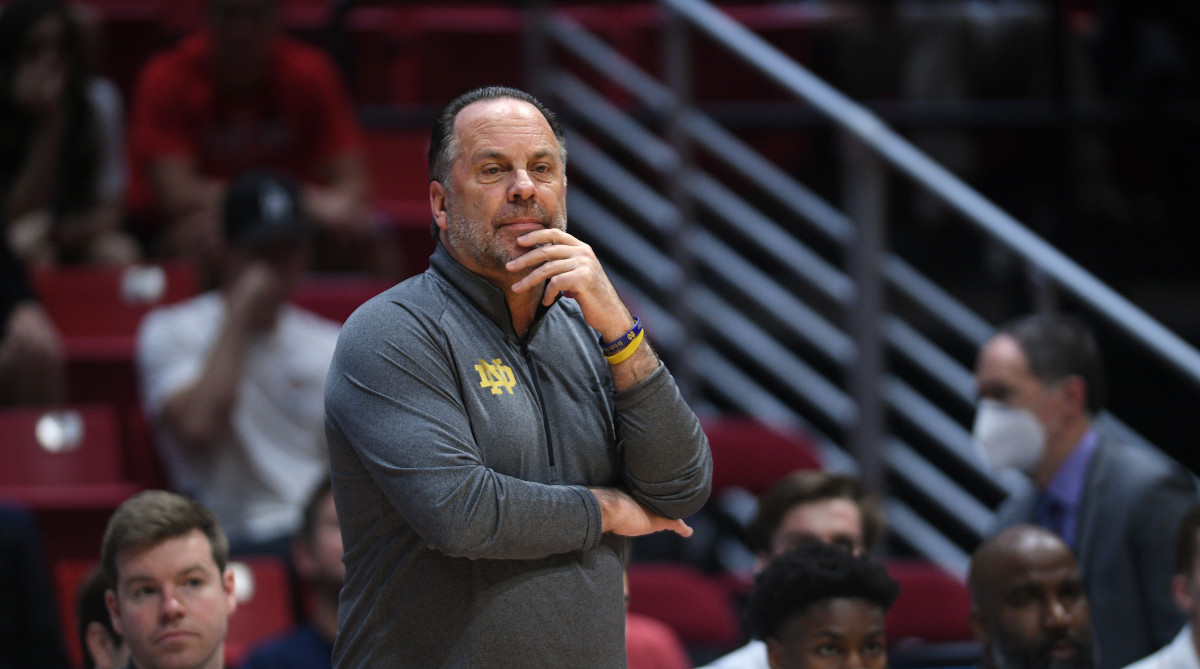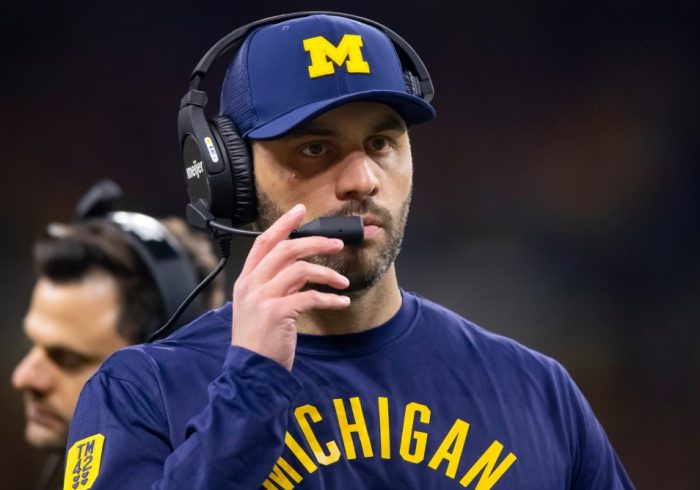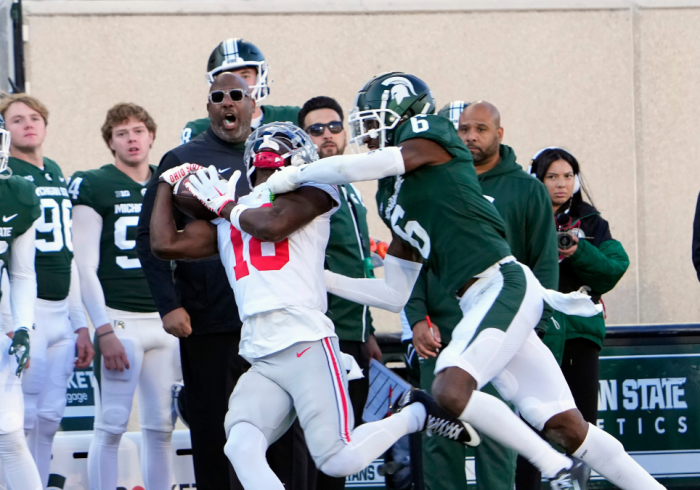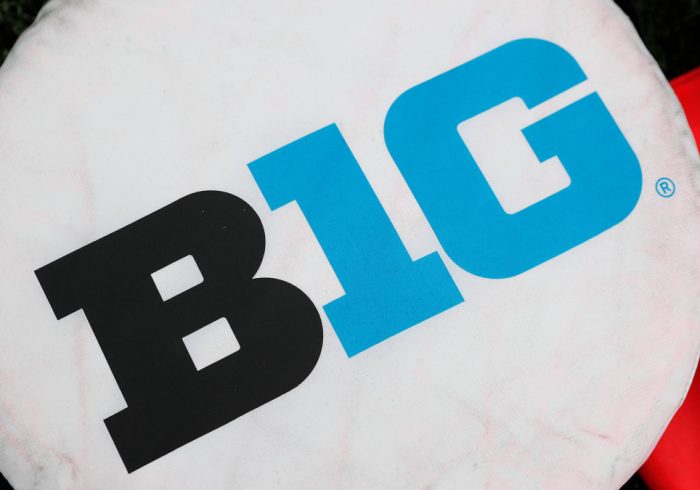In an increasingly complicated and compromised profession, Mike Brey kept his coaching philosophy simple and unwavering. “Go to class and don’t turn the ball over, and we’ll get along fine,” went the mantra. He ran a clean program and preferred clean basketball, and Notre Dame has benefitted greatly from his 23-year tenure.
Thursday afternoon, the school announced that Brey will step aside at season’s end. When that time time comes, Notre Dame’s all-time winningest men’s basketball coach will have nearly 500 victories at the school, about 100 victories more than runner-up Digger Phelps. He’s been a great fit for a long time, in a sport where welcomes tend to wear out quickly.
But barring an absurd miracle run by Brey’s lackluster final team, Phelps will still own the only Final Four appearance in Fighting Irish history—and that was 45 years ago. It is an enduring mystery why Notre Dame has not been able to elevate into the sport’s upper echelon for anything longer than an occasional blip in time.
Catholic schools have had an immense historic impact in men’s college hoops. The list of national champions is long: Villanova three times; San Francisco twice; Georgetown, Marquette, Loyola Chicago, La Salle and Holy Cross once apiece. Several others have advanced to the NCAA tournament title game: Gonzaga (twice), Seton Hall, Dayton, Seattle, St. John’s.
Notre Dame? Never. The most athletically accomplished and ambitious of all Catholic schools traipsed into that one Final Four in 1978 and lost to Duke, which then lost to Kentucky for the title. And the Irish have never been back since.
That could have something to do with priorities, of course. Of the dozen schools listed above who have won a hoops title or played for one, zero engage in big-time football. Notre Dame pretty much invented big-time football. That’s always been the sport of utmost importance beneath the Golden Dome.
Brey’s Fighting Irish flirted with a title run in 2015, but ultimately never reached the sport’s pinnacle.
Orlando Ramirez/USA TODAY Sports
Yet that shouldn’t preclude the Irish from being better in men’s basketball. It’s not an either-or proposition. The women’s program has won two national championships, played in five title games and been to nine Final Fours, so it’s not like there’s something in Purcell Pavilion that prevents Notre Dame from hoops greatness.
The men’s program needs to find its own Muffet McGraw, a great coach who wanted to be at the school. Brey was that guy—philosophically aligned and willing to work within Notre Dame’s strictures—but without the titles or Final Fours. His best chance was in 2015, when that March came achingly close to being the best month in the history of the Fighting Irish men’s program.
Notre Dame went into Greensboro, the traditional heart of the Atlantic Coast Conference, and won the league tournament by beating Duke and Notre Carolina on successive nights. Given a No. 3 seed in the NCAA tournament, the Irish beat Northeastern in the first round, survived Butler in overtime in the second, then cruised past Wichita State in the Sweet 16.
What stood between Brey and the Final Four was 37-0 Kentucky, an absolute juggernaut rife with NBA talent. The Irish played a smart and steely game, controlling the tempo and battling the bigger Wildcats inside, with neither team ever leading by more than six points. Heeding Brey’s credo, Notre Dame turned the ball over just once in the second half and had the lead most of the final six minutes.
But star players Jerian Grant and Pat Connaughton each missed one free throw during that closing stretch, and Kentucky’s Andrew Harrison broke a tie game by making two foul shots with six seconds left. Grant’s three at the buzzer missed, and the chance to score an upset commensurate with the most famous win in school history—breaking UCLA’s record 88-game winning streak in 1974—had passed.
Brey brought Notre Dame back to the Elite Eight the following year as a No. 6 seed, but the underdog Irish were rolled in the second half by North Carolina. From that point forward, the magic dissipated. Just two of Brey’s next six teams made the NCAAs, and neither of those advanced past the second round.
Last season felt like a valedictory. Brey coaxed a veteran cast plus freshman Blake Wesley (who would be a first-round draft pick) into the tourney as a No. 11 seed, then beat Rutgers in the First Four and upset Alabama in the round of 64. Notre Dame had Texas Tech on the ropes late but let it get away, and speculation proliferated about Brey retiring then.
Instead he came back, as did the veteran core of that team plus five-star freshman J.J. Starling, but the results have been dismal. The Irish are 9–10 overall, just 1–7 in the ACC. When a 5–13 Florida State team went into South Bend Tuesday night and rolled to a 29–8 lead en route to an easy victory, everyone had seen enough.
There aren’t many coaches in the profession as well-liked as Brey. If he has enemies, nobody knows who they are. He’s witty and never takes himself too seriously. He’s assumed leadership positions within the coaching fraternity and been an eager participant in discussions about the direction of the sport, both on and off the court. He also has been willing to discuss the sport’s underbelly while many of his colleague shrank from the topic.
Brey also was everything Notre Dame hoped he would be. When he arrived after beginning his head-coaching career at Delaware, the Irish hadn’t been to the NCAA Tournament in a decade. Upon departure, he will have at least 13 NCAA berths on his résumé.
The only thing lacking is what has been lacking from every Notre Dame coach who came before him: a national championship.



